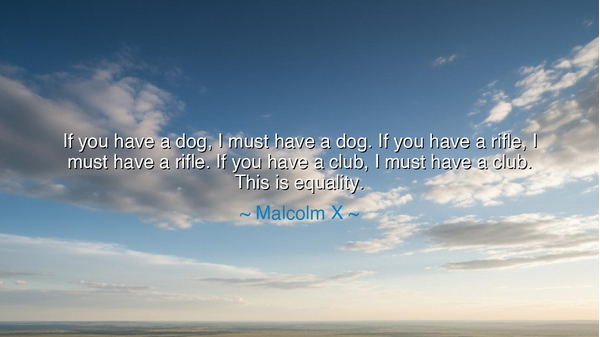
If you have a dog, I must have a dog. If you have a rifle, I must
If you have a dog, I must have a dog. If you have a rifle, I must have a rifle. If you have a club, I must have a club. This is equality.






The fiery words of Malcolm X—“If you have a dog, I must have a dog. If you have a rifle, I must have a rifle. If you have a club, I must have a club. This is equality.”—thunder with the urgency of a man who knew oppression not as theory, but as lived reality. In these lines, he strips the idea of equality to its raw essence: it is not lofty speeches, not empty promises, but a balance of power. When one side holds weapons, guards, and means of defense, and the other side is left vulnerable, there is no equality, only domination. Malcolm X reminds us that the first test of fairness is this: what one man is allowed to possess, another must also be free to possess.
These words arise from a time when African Americans lived under the shadow of brutality. Police unleashed dogs against peaceful protestors, nightsticks and clubs rained down upon men and women demanding justice, and rifles were turned against communities whose only crime was the color of their skin. In such a world, Malcolm X’s declaration was not a metaphor but a necessity. He demanded that if the oppressor had the right to arms, then the oppressed must claim the same right, for otherwise equality was but a hollow illusion.
History shows us the power of his vision. In the 1960s, groups like the Deacons for Defense and Justice in Louisiana took Malcolm X’s message to heart. They were ordinary men—fathers, workers, veterans—who armed themselves to protect Black communities against the terror of the Ku Klux Klan. Their stance was not born of violence but of defense. When the Klan came with rifles and fire, the Deacons stood ready with their own. And when both sides were armed, attacks diminished, for the oppressor no longer had the advantage of unchecked power. Thus Malcolm’s words became flesh: true equality exists only when the balance of power is level.
But let us also see the deeper truth beyond weapons. Malcolm X spoke not only of dogs and rifles, but of the principle that whatever rights or tools society grants to one group must be granted to all. If one has access to education, then all must. If one has the freedom to speak, then all must. If one has the means to defend his dignity, then none should be denied it. His quote, rooted in the harsh realities of his time, transcends them—it becomes a universal lesson in justice.
Yet his words are often misunderstood. He did not glorify violence; rather, he glorified self-respect. He taught that equality cannot mean submission, nor can freedom mean asking politely for what is already yours by right. To stand equal is to refuse to be defenseless in the face of aggression. This is not the cry of vengeance, but the cry of dignity: that a man or woman must have the same tools to guard life, liberty, and family as any other.
The lesson for us is profound. Equality cannot exist where power is lopsided. A people without the means of protection—be it weapons in Malcolm’s age or access to education and resources in ours—are at the mercy of those who possess them. If justice is to be real, then balance must be restored. This principle applies in every arena: in law, in opportunity, in wealth, in the rights of nations. True peace is not the absence of struggle, but the presence of equilibrium.
Practical wisdom flows from this teaching: wherever you see imbalance, work to level it. If others have knowledge, seek knowledge. If others have a voice, raise yours. If others have means to protect their dignity, demand the same for yourself and your community. Equality is not given—it is claimed, insisted upon, and defended. And when balance is established, when no man stands above another by force of arms or privilege alone, then the soil is ready for justice to grow.
Thus, let the words of Malcolm X endure as a trumpet blast: equality is not rhetoric, but reality. It is not found in petitions alone, but in the refusal to remain defenseless. And until the oppressed stand with the same strength as the oppressor, the promise of freedom will remain unfulfilled. His call is both warning and inspiration: if you would be free, you must be ready to stand as an equal in all things. Only then will justice walk the earth like a living flame.






AAdministratorAdministrator
Welcome, honored guests. Please leave a comment, we will respond soon